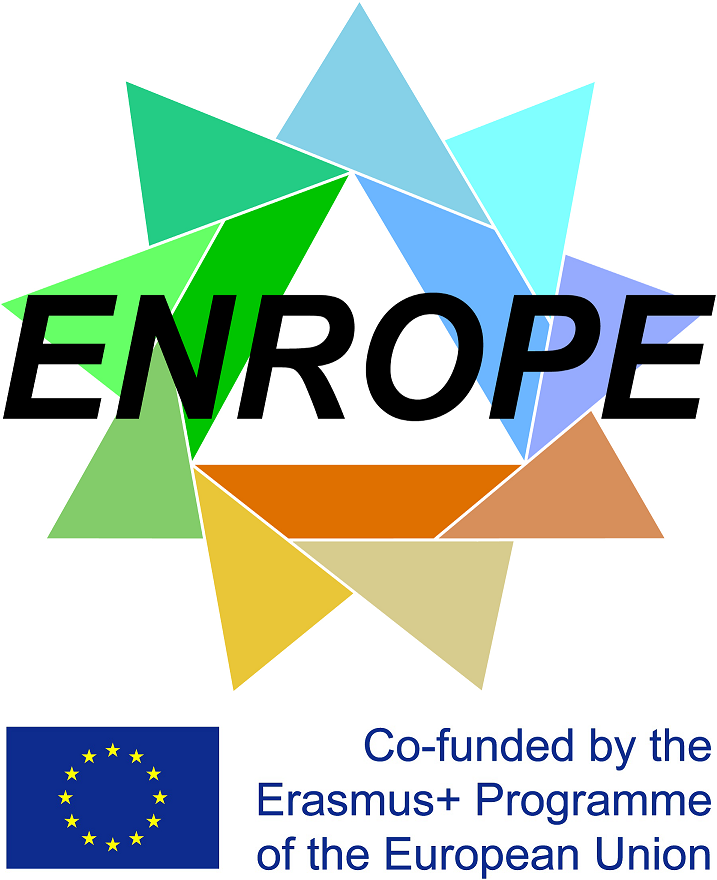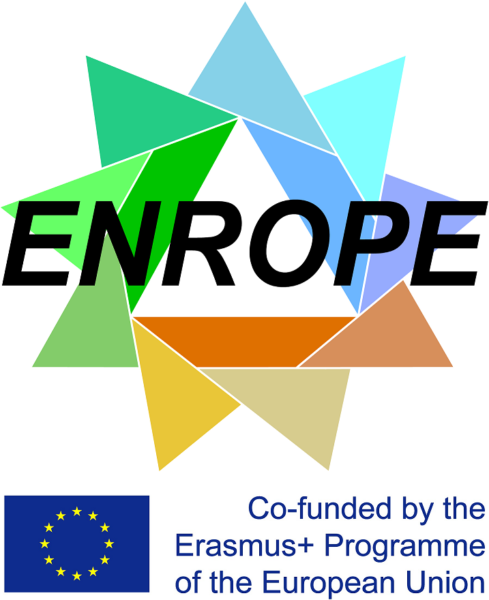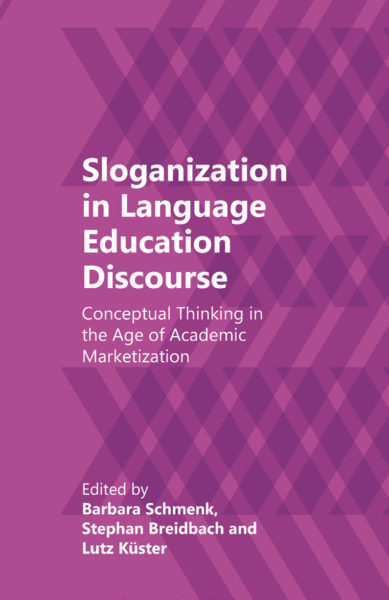Dear LANGSCAPE members, colleagues, and in particular, dear early career researchers,
The ENROPE project’s first Intensive Study Week (ISW#1) will be held from 17th to 21st June at the Humboldt-Universität zu Berlin. It is aimed at early career researchers (MA, doctoral, postdoctoral) working in the field of plurilingualism and education from Higher Education institutions worldwide.
On 1st March, the deadline of the Call for Applications for ENROPE’s ISW#1 has been extended. The new deadline ends on 15th March 2019.
The Intensive Study Week will offer opportunities to:
- discuss issues of pluri-/multilingualism and
education with experts and peers - advance their individual research projects
- reflect their personal identities as researchers
and educators - develop their professional competencies through
innovative (digital) tools
To find out more about the ENROPE Intensive Study Week #1, please see:
ENROPE Call for Applications ISW#1 Berlin (extended version)
To download the ENROPE Call for Applications ISW# 1 Berlin (extended version) poster, please use this link.
To apply for the ENROPE ISW#1, please visit the project’s website.
You are most welcome, and indeed expressly invited, to circulate and disseminate the extended Call for Applications via your professional networks.
Kind regards,
Florian Möller
Dear LANGSCAPE members, esteemed colleagues, and friends,
Last year LANGSCAPE’s very own peer-reviewed online journal, titled Language Education and Multilingualism, released its first volume. Since then the editor team, i.e. Marie-Françoise Narcy-Combes, Christiane Fäcke and Stephan Breidbach, have not only worked tirelessly to prepare the second volume. But, earlier this year, they also circulated the call for proposals for the third volume of the journal. Said third volume will focus on the topic of Multilingual life in urban linguistic landscapes. The editor team cordially invite your contributions to this volume of the journal.
Please see the call for proposals below for more details on the aim and focus of the volume.
Language Education and Multilingualism publishes original work in English, French, German, or Spanish.
The call for proposals closes on March 1st, 2019. Full articles will be due by August 1st, 2019. Please send your proposal to the following address: langscapejournal@hu-berlin.de
LEM Vol 3_Call for Papers_deutsch
LEM Vol 3_Call for Papers_english
LEM Vol 3_Call for Papers_español
LEM Vol 3_Call for Papers_français
Please forward this CfP to colleagues interested in the topic and feel free to circulate it widely within your professional networks.
For further information about the journal, please visit the online site of Language Education and Multilingualism – The Langscape Journal or contact langscapejournal@hu-berlin.de
Kind regards,
Florian Möller

Dear LANGSCAPE members, and colleagues,
We are very happy to inform you that the next LANGSCAPE meeting will take place during the international conference on “Family languages: attitudes, uses, policies and experiences”. The conference, to be held from 5-7 December 2019 in Paris, will be organised by DILTEC from the Université Sorbonne Nouvelle-Paris 3 in collaboration with the EDA, Université Paris Descartes, the research departments of INALCO, the Université Paul Valéry Montpellier 3, PRAXILING, and the LANGSCAPE network.
Of course, we would like to invite you to not only join us during the conference, but to actively participate as well. For further details, please see the call for papers in French, English and Spanish below.
Kind regards,
Florian Möller
**
L’EA 2288 Diltec, Université Sorbonne Nouvelle – Paris 3, avec la collaboration de EDA, Université Paris Descartes, l’INALCO, de PRAXILING, Université Paul Valéry Montpellier 3 et de Langscape, ont le plaisir de vous annoncer la tenue du colloque international “Les langues dans la famille : attitudes, usages, politiques, histoires”.
Ce colloque a pour but de réunir des équipes de recherche intéressées par les problématiques autour des liens entre la famille, les langues et d’autres institutions socialement plus complexes. 5 axes sont proposés à titre indicatif :
– Transmissions linguistiques et transmissions culturelles
– Acquisition et plurilinguisme
– Perspectives sociolinguistiques
– Les langues de l’enfant : de la maison à l’école et de l’école à la maison
– Approches transversales à partir de corpus littéraires et artistiques
Les thématiques et les approches gagneront à être croisées.
Téléchargez l’appel à propositions ici.
Date limite pour envoi de propositions : 15 mai 2019
Retours du CS prévus pour le 1 juillet 2019
Programme à venir. Propositions à soumettre directement dans le site du colloque https://languesfamille.sciencesconf.org/submission/submit
**
The Université Sorbonne Nouvelle EA 2288 DILTEC, Université Sorbonne Nouvelle – Paris 3, in collaboration with the EDA, Université Paris Descartes, the research departments of INALCO, the Université Paul Valéry Montpellier 3, PRAXILING, and Langscape are pleased to announce the international conference “Family languages: attitudes, uses, policies and experiences”.
The purpose of the conference is to bring together research teams interested in issues around the links between family, languages and other socially more complex institutions. 5 axes are proposed as an indication:
– Linguistic transmission and cultural transmission
– Acquisition and multilingualism
– Sociolinguistic perspectives
– Children’s languages: from home to school and school to home
– Literary and artistic corpus: an interdisciplinary approach
Participants are encouraged to send proposals that cross several axes.
You may download the call for papers here.
You may send your proposal before the 15th of May 2019
Confirmation of acceptance expected by the 1st of July 2019
Program to come. Please submit your proposals on the conference website https://languesfamille.sciencesconf.org/submission/submit
**
El EA 2288 DILTEC de la Universidad Sorbone Nouvelle – Paris 3, en colaboración con el laboratorio EDA, de la Universidad Paris Descartes, INALCO, PRAXILING de la Universidad Paul ValérieMontpellier 3 y Langscape tienen el placer de anunciar el coloquio internacional “Las lenguas en el seno de la familia: actitudes, usos, políticas e historias”.
El propósito de la conferencia es reunir equipos de investigación cuyos trabajos de investigación tengan relación con los vínculos entre la familia, los idiomas y otras instituciones socialmente más complejas. Se proponen 5 ejes a título indicativo:
– Transmisiones lingüísticas y transmisiones culturales
– Adquisición y plurilingüismo
– Perspectivas sociolingüísticas
– Las lenguas del niño/ la niña: de la casa a la escuela y de la escuela a la casa
– Enfoques transversales basados en corpus literarios y artísticos
Se recomienda enviar propuestas que integren varios ejes.
La convocatoria puede ser descargada desde aquí.
La fecha límite de envío de propuestas es el 15 de mayo de 2019
Respuesta del CS prevista para el 1 de julio de 2019
El programa se comunicará próximamente El envío de propuestas se realiza directamente desde la página del coloquio https://languesfamille.sciencesconf.org/submission/submit
**
Dear fellow LANGSCAPE members,
we would like to bring a new video regarding multilingualism to your attention. It was recently published by Durk Gorter and Jasone Cenoz as part of their work for the ‘Donostia Research group on Education and Multilingualism’ (DREAM) of the UPV/EHU (Universidad del País Vasco / Euskal Herriko Unibertsitatea) and illustrates their research on multilingualism in educational settings in the Basque Country, dealing with translanguaging, multilingual language education and CLIL.
To see the video on youtube.com, please follow this link.
Kind regards,
Florian Möller
Dear LANGSCAPE members, colleagues, and friends,
We are glad to invite you to participate in the ENROPE project’s first Intensive Study Week. It will be held from 17th to 21st June at the Humboldt-Universität zu Berlin and is aimed at early career researchers (MA, doctoral, postdoctoral) working in the field of plurilingualism and education from Higher Education institutions worldwide.
The Study Week will offer opportunities to:
- discuss issues of pluri-/multilingualism and
education with experts and peers - advance their individual research projects
- reflect their personal identities as researchers
and educators - develop their professional competencies through
innovative (digital) tools
To find out more about the ENROPE Intensive Study Week #1, please see:
To apply for the ENROPE Intensive Study Week #1, please visit the project’s website.
Of course, you are invited and whole-heartedly encouraged to circulate this Call for Applications within your professional networks.
Kind regards,
Florian Möller

Dear fellow LANGSCAPE members, colleagues, and friends,
Today, I am very happy to announce that the new LANGSCAPE website is online! After many unforeseen delays, work on the site has finally progressed so far that we have decided to make it available to you and the wider public. Without more ado, please let me invite you to visit our new LANGSCAPE website at https://langscape.hu-berlin.de/en/.
Of course, work on the site, not to mention constant maintenance, are ongoing. Accordingly, your feedback will be needed to continually improve our webpage. If you do have any suggestions or constructive criticism, please let me know via langscape@hu-berlin.de
Kind regards,
Florian Möller
Dear LANGSCAPE members, friends, and colleagues,
The call for contributions to the 3rd volume of LEM is now open.
This volume will focus on the topic of Multilingual life in urban linguistic landscapes. Please see the call for papers below for a full description of the aim and focus of the volume.
The journal publishes original work in English, French, German, or Spanish.
The call for proposals closes on March 1st, 2019. Full articles will be due by August 1st, 2019. Please send your proposal to the following address: langscapejournal@hu-berlin.de
LEM_Vol 3_Call for Papers_deutsch
LEM_Vol 3_Call for Papers_english
LEM_Vol 3_Call for Papers_español
LEM_Vol 3_Call for Papers_français
Please forward this CfP to colleagues interested in the topic and circulate it widely within your professional networks.
For further information about the journal, please visit the LANGSCAPE website or the online site of Language Education and Multilingualism – The Langscape Journal.
Kind regards,
Stephan Breidbach (editor)
Christiane Fäcke (editor)
Marie-Françoise Narcy-Combes (editor)
Dear fellow LANGSCAPE members,
In early November the volume “Sloganization in Language Education Discourse”, edited by Barbara Schmenk, Stephan Breidbach and Lutz Küster, was published by Multilingual Matters. In close coopertation with the book’s editors the authors David Gramling, Dietmar Rösler, Gerhard Bach, Britta Viebrock, John Plews, David Block and Aneta Pavlenko contributed chapters to this interesting critical analysis of conceptual thinking in the age of academic marketization.
Further information about the book please visit the corresponding Multilingual Matters website.
Kind regards,
Florian Möller
Dear LANGSCAPE members, colleagues, and friends,
To all of you who have not heard the good tidings yet: ENROPE, an Erasmus+ Strategic Partnership project originating in and spreading the spirit of LANGSCAPE, has been granted by the European Union. It was successfully launched in September and will run until August 2021. The project consortium consists of nine partners from six European countries (see below) with Humboldt-Universität zu Berlin acting as lead partner and many other LANGCAPE members being actively involved.
ENROPE stands for “European Network for Junior Researchers in the Field of Plurilingualism and Education” and aims at providing qualification and networking structures for doctoral and post-doctoral researchers in the above-mentioned field. It encourages researchers as well as educators in foreign language education to develop more plurilingual mind-sets and practices. As part of its aim to foster strong and reflected professional identities, ENROPE will create an Intensive Study Programme (ISP) providing junior researchers with opportunities for transborder collaboration and professional qualification. The ISP will consist of three annual training weeks, linked and enhanced through regular online training phases. A versatile Online Platform will be the central hub of the wide and diverse network that ENROPE is going to establish. The platform will offer spaces and tools for international and field-specific collaboration, e.g. an E-Portfolio as a means to engage in meaningful professional self-reflection. A Qualification Handbook will allow for wide adaption and dissemination of the project’s key concepts, products and training activities.
ENROPE’s kick-off meeting, held in Frankfurt (Main) 10th/11th September, proved to be a lively and promising opportunity to exchange ideas on plurilingualism and education and to advance the various project activities.
Thanks to all LANGSCAPE members who directly and indirectly helped to make ENROPE possible! Please continue to support the project by spreading the word, especially to junior researchers in your individual contexts.
Kind regards,
Katrin Schultze
Upcoming ENROPE Events:
| 21./22.03.2019 | Transnational Project Meeting # 2 | University of Exeter | (official partners only) |
| 17.6.-21.6.2019 | Intensive Study Programme # 1 | Humboldt University Berlin | |
| 21./22.6.2019 | Transnational Project Meeting # 3 | Humboldt University Berlin | (official partners only) |
Consortium Members:
Fryske Akademy Leeuwarden
Goethe Universität Frankfurt am Main
Humboldt-Universität zu Berlin
İstanbul Üniversitesi-Cerrahpaşa
Tallinna Ülikool
University of Exeter
Universitat Ramon Llull
Universität Siegen
Université Sorbonne Nouvelle – Paris 3
Further Information & Contact:
Project Coordinators at Humboldt-Universität zu Berlin:
Prof. Dr. Stephan Breidbach, Dr. Katrin Schultze, Regine Schlösser
KA 203 – Strategic Partnerships for Higher Education – 2018-1-DE01-KA203-004253
Dear LANGSCAPE members,
During the LANGSCAPE Conference 2017 in Leeuwarden/Ljouwert (NL) we had the opportunity to listen to Erika Kalocsányiová’s interesting talk about her research project. Albeit rather belatedly, we would like to draw your attention to the fact that by now her dedicated work has developed into an article titled “At the borders of languages: the role of ideologies in the integration of forced migrants in multilingual Luxembourg”.
Her paper considers the role of language ideologies in the linguistic integration of forced migrants. It discusses the findings of an ethnographic exploration that was conducted in Luxembourg with five individuals who sought refuge there. A network of teachers and institutional representatives constituted the secondary pool of research participants. Through analysis of metalinguistic discourse and narrative episodes, the paper scrutinises the instrumental and integrative dimensions of language. In particular, it draws attention to and problematises the hegemonic ideologies that inform linguistic integration. By bringing into focus multilingual realities and mobile aspirations, this research seeks to provide a new impetus to the reconceptualisation of integration.
You can read Erika Kalocsányiová’s full article by following this link.
Kind regards,
Florian Möller




